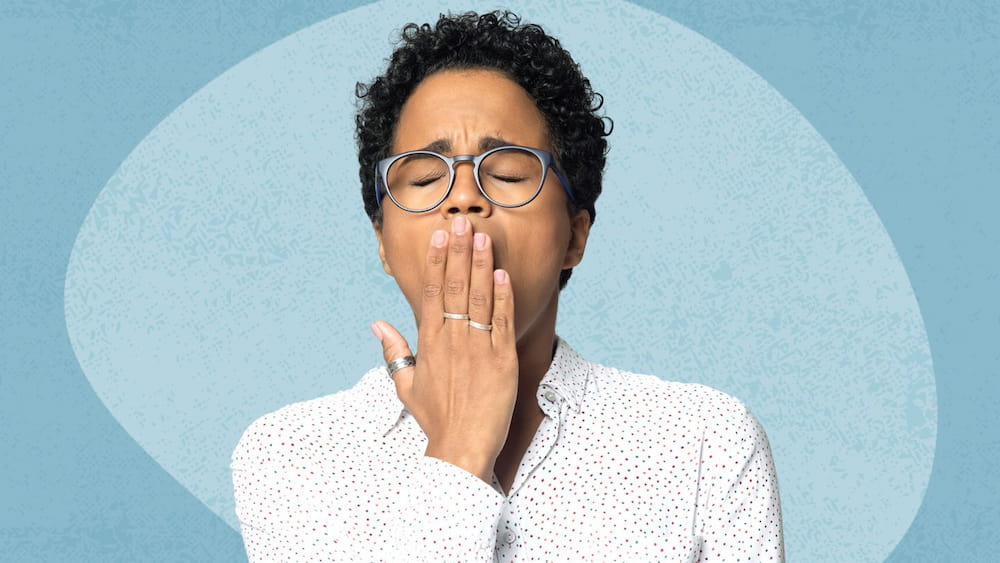What Happens to You When You Don’t Sleep for Days? Frequently Answered

Most people will have a taste of sleep deprivation at some point in their lives due to things like all-night study sessions, significant business deals, and new babies. What happens to you when you don’t sleep for days? Even though an occasional lack of sleep might not seem like a big deal, its effects can last for days. Lack of sleep can seriously harm your health, especially if it becomes a habit.
We run a higher risk of developing serious illnesses like diabetes, heart disease, and obesity when our sleep quality is chronically poor. In order to regulate appetite, metabolism, and glucose processing, the body releases hormones while you sleep. Cortisol, also known as the stress hormone, is produced by the body more often when people don’t get enough sleep. In addition, getting too little sleep appears to mess with other hormones. After eating, less insulin is released, and this, combined with the rise in cortisol, may cause too much glucose to accumulate in the bloodstream, increasing the risk of type 2 diabetes.
Although every person is unique, the Centers for Disease Control and Prevention recommends that adults get between seven and nine hours of sleep every night. Contrary to popular belief, sleeping an extra hour or two on the weekends won’t make up for any sleep deprivation you may have endured during a busy week. Additionally, it might alter your circadian rhythm, which could cause insomnia on Sunday night. The best way to control the body clock is to maintain a regular sleep schedule.
For more specific information, keep reading.
Table of Contents
What Happens to You When You Don’t Sleep for Days?
Cognitive Issues
Proper sleep is essential for our brain. Not only does it improve our performance at work, but it also clears the toxins and waste products that have accumulated throughout the day via the glymphatic pathway. Only when we are asleep does this pathway become accessible.
It follows that even after just one sleepless night, our brain will be the first to suffer.
24 Hours: Brain Fog
Even though brain fog is not a medical condition, it is still a very unpleasant condition. The inability to concentrate or express your thoughts clearly, a sense of disorientation, a decline in decision-making behavior, and memory problems are some of its most typical symptoms.
36 Hours: Decreased Intellectual Performance
You will perform significantly worse overall if you stay awake for an additional 12 hours. Even simple tasks will take an eternity to complete, and you may find yourself unable to come up with ideas or follow directions. Sleep deprivation can be dangerous if you decide to drive home alone because your reaction time will also slow down. Various studies have found that drowsy driving is a factor in up to 20% of all car accidents in the USA.
48 Hours and More: Memory Impairment
You’ll have more memory issues after another night of being awake. According to some studies, getting enough sleep is essential for developing both procedural memory (the capacity to repeat tasks that have been remembered) and declarative memory (the memory of events or facts). Additionally, getting enough sleep reverses the effects of lack of sleep by helping short-term memories become long-term ones.
“Chronic sleep deprivation is more likely to occur in people who work in industries like healthcare, transportation, network administration, and other jobs that require night shifts and erratic schedules.”
Physical Stress
The next victim of the heat is our body. Most common physical symptoms of sleep deprivation are the following:
24 Hours: Daytime Sleepiness
You’ll feel this after going without sleep even for a day. This is due to the fact that while we sleep, our body replenishes the glycogen stores in our muscles and liver. Your body responds to being deprived of this possibility by staying awake for 12 hours or longer by becoming sleepy during the day.
36 Hours: Immune Suppression
According to some studies, getting too little sleep can increase your risk of getting the flu or a cold by four times. The problem is that lack of sleep lowers body temperature, which makes you more susceptible to viruses and germs. Additionally, while you sleep, a group of proteins known as cytokines are produced. Sleep deprivation likely results in a lack of cytokines in the blood, which again contributes to immune suppression. Cytokines are essential for combating inflammation.
48 Hours and More: Increased Cardiovascular Risks
Your heart may also be affected by the inflammation that sleep deprivation causes. The American Heart Association states that adults who sleep 6 hours or less per night are most at risk of developing coronary artery disease and chronic hypertension.
“Microsleep episodes are yet another way for your body to tell you that it needs to sleep. Microsleep is a brief knockout that lasts for only a few seconds, but it can be dangerous if you’re driving or performing other tasks that call for rapid thinking and quick reactions.”
Hormonal Imbalance
Our endocrine system functions as an extremely brittle clock. Furthermore, a lack of sleep is a very simple way to throw that clock off.
24 Hours: Stress
Your blood’s level of cortisol rises when you don’t get enough sleep. Your body as a result goes through constant stress and anxiety. Cortisol not only causes these things, but it also causes your skin’s collagen fibers to break down and inflame. Therefore, if you frequently stay up until sunrise, be ready for a dull and wrinkled face.
36 Hours: Impulsive Eating Behavior
Hormones also regulate the length of your periods of satiety and hunger. Lack of sleep throws off the ratio of ghrelin to leptin levels, which makes you more prone to impulsive eating. Additionally, because of the lack of sleep, people tend to crave foods high in carbohydrates, such as baked goods and sweets.
48 Hours: Diminished Libido
Although having sex can actually help you sleep better, chronic sleep apnea will make you reluctant to jump into a bed of love. Studies on sleep-deprived men revealed that testosterone levels in their blood decreased by 10-15% after a week of insufficient sleep (5 hours or less).
“Additionally, lack of sleep increases the risk of thyroid, diabetes, and obesity.”

What is Sleep Deprivation?
When you don’t get enough sleep, you experience sleep deprivation, as the name suggests. Chronic sleep deprivation can cause chronic fatigue in workers if they routinely get less sleep than 7 to 9 hours per night.
The practice of delaying sleep in order to accomplish more is all too common among heavy industry operators or shift workers. Even though at the time it might seem like a good idea, nobody can function without sleep, despite what they might like to believe.
If you don’t get enough sleep, eventually the unfavorable effects of sleep deprivation will catch up with you. However, different people are affected by sleep deprivation in different ways. Some of the more common short-term symptoms include:
- Workplace fatigue
- Diminished decision-making and coordination
- Communication
- Memory
- Weakened immune system
After a stressful day or night at work, your body has a chance to rest and rejuvenate itself while you sleep. After a demanding shift, it’s never a good idea to deny yourself the chance to relax.
What Long-Term Risks Come With Sleep Deprivation?
Everyone is aware of how fatigued and irritable you can feel the next day after just one night of poor sleep. However, not everyone is aware of the dangers of chronic sleep deprivation.
Can Sleep Deprivation Kill You?
In a nutshell, you will die if you force yourself to stay awake and forgo sleep. A man attempted to watch every game of the 2012 European Championship, going a total of 11 days without sleep. He eventually passed away.
However, the time it takes to die and the precise cause of death can differ from person to person. Others may die sooner or later down the road, while some people only last a week or two before they pass away.
Your immune system is suppressed, making you more prone to illness; you produce more cortisol, a stress hormone; your blood pressure increases; and your internal temperature decreases when your body is under stress from lack of sleep.
It is possible for some people to pass away from hypothermia when their internal temperature falls too low. Others, whose immune systems are unable to combat germs or infection, may pass away as a result of bacteria or illness.
Researchers only conduct sleep deprivation studies on humans for no more than 2 or 3 days due to a number of moral and ethical considerations. Despite the fact that going days without sleep is unhealthy for everyone, each person has a different threshold for when sleep deprivation becomes fatal. Since voluntary sleep deprivation is much more dangerous than people may realize, organizations like the Guinness Book of World Records refuse to even consider submissions for it.
What About Losing a Little Sleep Every Night?
Most people don’t sleep-free for a full 24 hours. Even so, it doesn’t necessarily follow that everyone is sleeping the recommended number of hours every night.
- If you only get 3, 4, or 5 hours of sleep each night, what happens?
- Is one night of poor sleep equivalent to one week of sleep deprivation?
- Can you “make it up” on the weekend?
Sleep deprivation, as was previously mentioned, goes beyond a single night of insufficient rest. Getting fewer than the advised 7-9 hours of sleep each night is known as sleep deprivation. Consistently doing this causes serious problems, including decreased productivity and safety, among other things.
According to some, one can miss out on sleep during the week and make up for it on the weekend. The science appears to be against it, though there is still much disagreement on this.
The most obvious and basic solution is to prioritize getting enough sleep each night, ideally between seven and nine hours.
How Much Sleep Do You Need Actually?
A good night’s sleep makes everyone feel better. But now, courtesy of a National Sleep Foundation report, you can aim for a specific sleep target based on your age.
The foundation based its report on two years of research and breaks it down into nine age-specific categories, with a slight range that allows for individual preferences:
- Adults aged 65 and older: 7 to 8 hours.
- 7 to 9 hours for adults aged 26 to 64.
- 18 to 25 year old young adults: 7 to 9 hours.
- Teenagers aged 14 to 17: 8 to 10 hours.
- Those 6 to 13 years old who are in school: 9 to 11 hours.
- 10 to 13 hours for preschoolers aged 3 to 5.
- Toddlers aged 1 to 2: 11 to 14 hours.
- 4 to 11-month-old infants: 12 to 15 hours.
- 14–17 hours for newborns and children under 3 months.
The amount of sleep you require for your best health and daily performance may also depend on genetic, behavioral, and environmental factors, according to medical research.





















